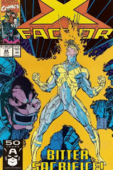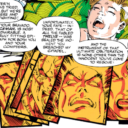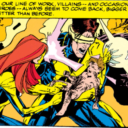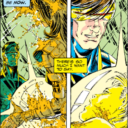 X-Factor #68, Wolverine #41, Excalibur #39, New Warriors #13, Spider-Man #12, Nick Fury, Agent of Shield #25, Marvel Comics Presents #70.
X-Factor #68, Wolverine #41, Excalibur #39, New Warriors #13, Spider-Man #12, Nick Fury, Agent of Shield #25, Marvel Comics Presents #70.
Theme Music:
Lazlo Hollyfeld – Buffaloallamericacity
Podcast (dangerroompodcast): Play in new window | Download
Subscribe: RSS



Howdy J & A,
I can certainly see where you are coming from with the confusing nature of the story telling in this X-Factor arc. After re-reading this arc as an adult and having some background knowledge of the writers of X-Factor and their struggles with Marvel Editorial at the time, I found this a little more entertaining to read. You probably have listened to Claremont, Simonson and Noccenti talk about battles with Shooter and Harris during the 80’s and early 90’s over “editor-mandated” plots and characters, so this is what I am referring to.
I know that you guys will not do this BUT if you want to try to have a little fun go back to X-Factor issue #68 and do the following. On page 1 replace the first mention of “Apocalypse” with the word “Harris”. With that in mind, you can go back and re-read all of Cyclops narration and read it as Claremont talking to the audience about Harris (just read the narration). Claremont was never on board with Cyclops being brought back into the super-hero fold after he wrote him having a happy ending with Madelyn and their child. This arc would be Claremont’s last arc before he quit in the middle of the Muir Island saga, so I think he tried to take this opportunity to kind of book-end his Dark Phoenix saga with this story. There are some obvious references to it such as Scotts reference to him losing a psychic duel with Mastermind in UXM #133 and of coarse the Watcher at the end giving us a speech about why this was important.
Was this arc earned? I found it hard to connect to because of the poor story telling from the art side but I really think Claremont tried his best to leave one of his favorite characters in a good place by making him have to make a sacrifice, in some way redeeming him for his past transgressions (brought on by the editors).
If you guys do not like Mark Badger’s art cant see you liking Larry Stroman’s art but we will see.
I find it hard to disagree with your opinions on the Spider-Man book. While I liked it much better than you guys did, I do think you can see how hard McFarlane struggles with his writing. I think what McFarlane was trying to do was keep up with writers like Alan Moore & Frank Miller. He was given a chance to do his own book in his own corner of Marvel with any of the biggest characters he wanted. I think his problem was Marvel did not like how “dark” he was wanting to go and this ultimately lead to him saying “F-it, I’ll go do my own thing”. If you look at what DC had been doing for the last 5-7 years, you can see why he thought this direction would be a good way to go. Even though Marvel embraced big-guns and big-breasts they still where not really ready to go for that more “mature audience stuff”. I think his writing was very derivative of the “Revisionist Movement” that Moore, Morrison and Miller had been doing. I do not think Marvel was ready for that and he was not ready to write.